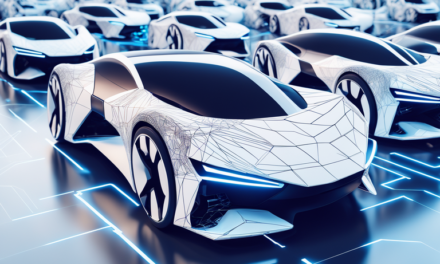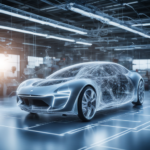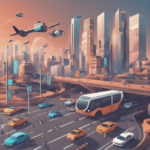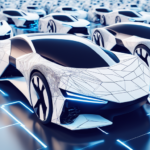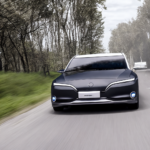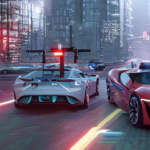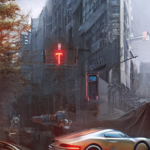The Automotive Industry’s Drive Towards AI and Web3
The automotive industry is accelerating towards a future shaped by artificial intelligence (AI) and Web3 technologies. As these innovations permeate vehicle design, manufacturing, and customer experiences, they promise to radically transform transportation. AI and Web3 align with the industry’s perpetual appetite for cutting-edge solutions that enhance efficiency, sustainability, safety, and delight. Thesis: AI is an integral component of Web3 that will profoundly transform the automotive industry by optimizing operations, enabling autonomous driving, and providing hyper-personalized customer experiences.
Driving Operational Efficiency with AI
AI empowers automotive manufacturers to boost productivity across their value chain. In the design process, it helps generate countless iterations that meet aesthetic and engineering goals. AI analyzes data encompassing background noise, vibrations, and other indicators to predict equipment failures before they disrupt production. During assembly, smart robotics adeptly navigate factory floors while intelligent wearables enhance human worker capabilities.1 AI also optimizes the complex automotive supply chain. By tracking real-time data, AI systems give automakers more visibility for coordinating logistics. AI algorithms assess weather patterns, shipping routes, and other variables to plan optimal distribution.2 Once vehicles are on the road, AI leverages telemetry data and advanced analytics to enable predictive maintenance, minimizing downtime.3 McKinsey estimates that AI could create over $1 trillion of value annually across the global automotive sector by 2030.4 As AI permeates manufacturing, automakers like Toyota, Volvo, and Mercedes-Benz are forming partnerships and acquiring startups to accelerate adoption.5 For example, Mercedes-Benz recently acquired an AI startup called Factorial Energy to enhance electric vehicle battery technology.6 These initiatives underscore how AI is becoming integral to competitive strategy.
Pioneering Autonomous Driving with AI
Self-driving represents a monumental advance for the automotive industry. AI makes autonomous driving possible through perception systems that interpret visual, lidar, and sensor data to understand the vehicle’s surroundings.7 AI empowers navigation systems to plan routes, follow traffic laws, and handle complex environments. It also enables vehicles to learn from experience and improve over time.8 Tesla leads the autonomy race but faces competition from the likes of Mercedes-Benz, GM, and Ford who are aggressively developing in-house AI talent.9 The market potential is tremendous, with autonomous vehicles forecast to account for over 12 million units globally by 2030.10 AI propels this autonomous future. Partnerships between automakers and AI specialists also accelerate innovation in autonomous systems. For instance, Hyundai Motor Group recently invested $50 million into AI chipmaker Tenstorrent.11 This partnership integrates Tenstorrent’s AI chip technology across Hyundai, Genesis, and Kia vehicles to enhance automated driving capabilities. Strategic moves like this underscore the integral role of AI in pioneering transportation breakthroughs.
Delivering Hyper-Personalized Customer Experiences
AI is revolutionizing in-vehicle experiences. Conversational AI and virtual assistants like Claude provide personalized support to make every drive more intuitive. These systems can answer questions, recommend routes, provide vehicle status updates, and more.12 AI also enables predictive ride-sharing and vehicle scheduling based on customer habits and calendars.13 During the purchase process, AI empowers automakers to generate tailored digital ads and content that speaks to individual customer interests. Toyota leveraged IBM Watson for a campaign promoting its Mirai model by creating hundreds of unique ads targeting tech enthusiasts.14 AI also facilitates immersive virtual showrooms for brochure-free buying.15 After purchase, AI chatbots enhance customer service and support. Brands like Ford, Toyota, and Mercedes-Benz have already implemented conversational AI to engage with owners.16 AI thus enables the hyper-personalized experience consumers increasingly expect.
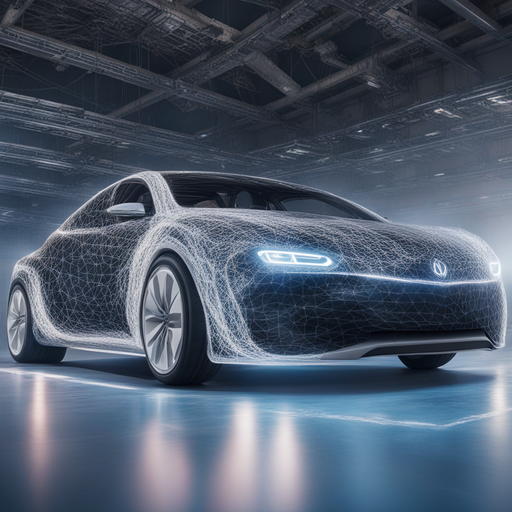 The Future of Automotive is AI and Web3
The Future of Automotive is AI and Web3
Web3 represents the next evolution of the internet where blockchain, decentralization, and token-based economies unlock new models. AI is intertwined with this future as automakers explore NFTs, metaverse sales, and decentralized vehicle data platforms. For example, Autentica – a UK startup funded by InnovateUK – is launching an NFT marketplace for 3D printed auto parts.17 Instead of physical delivery, Autentica transmits part designs to nearby 3D printing partners who produce and deliver parts on-demand. The NFTs act as digital certificates of authenticity and ownership. This blockchain-based system tackles counterfeiting while enabling more flexible, decentralized manufacturing. Nissan also recently announced plans for a metaverse autoshow allowing customers to browse inventory, interact with salespeople, and even finalize purchases virtually.18 They have trademarked terms like “Nissanverse” and “Infinitiverse” signaling intentions to sell virtual goods and NFTs. Other automakers are following suit with metaverse and NFT plans. As AI merges with Web3 infrastructure, it will open new frontiers for the industry. For instance, decentralized vehicle data platforms may let owners monetize their driving data via tokens. Smart contracts can automate insurance that charges per mile driven. NFT-based digital twins can represent ownership of autonomous taxi fleets operating within smart cities. An open, connected Web3 ecosystem will enable AI innovations not possible today.
The Road Ahead
From the Ford assembly line to drive assistance systems, the automotive industry has always leveraged cutting-edge technology. AI and Web3 represent the next horizon of transformation. Integrating these technologies will optimize manufacturing, unleash autonomous driving, and provide personalized experiences. Industry leaders recognize AI’s integral role in enabling this future as evidenced by major investments, partnerships, and acquisitions. The road ahead will undoubtedly be shaped by AI as part of an emerging Web3 ecosystem. Drivers and automakers alike will reap the benefits in efficiency, safety, and delight.
- Globant.com
- Blockchain News article: https://blockchain.news/news/nissan-expands-web3-efforts-with-trademarks-and-metaverse-auto-sales


